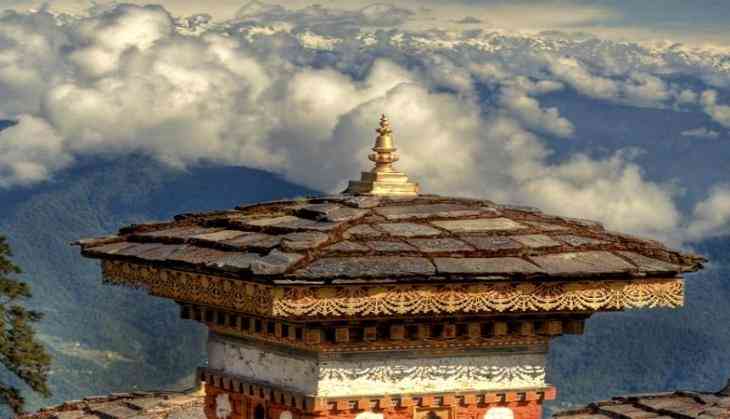
Unilateral actions to alter status quo in Doklam Plateau in tiny, helpless Bhutan has escalated tensions between China and its neighbours.
Beijing's recent aggressive move to construct a road from Doklam (Referred to by China as the Donglang Area of Yadong County in the Tibetan Autonomous Region) to an army camp in the Zomplri Area, has left the Himalayan kingdom, home to the concept of Gross National Happiness (GNH), quite disturbed and worried, so much so, that the Bhutanese government, through its embassy in New Delhi, has had to hand over a strongly-worded demarche to China's Ambassador to India, Luo Zhaohui, to ask its troops to cease construction activity immediately, withdraw from the area and refrain from changing status quo.
Indian troops were compelled to step in to cool temperatures, urge restraint and responsible behaviour earlier this month, as the construction activity undertaken by the People's Liberation Army (PLA) troops was taking place in a border area near the Chumbi Valley, where India has strategic and defence interests.
The Chumbi Valley in the TAR is a dagger shaped area that faces "Chicken's Neck", a thin strip of land in Siliguri, West Bengal, that separates India from Bangladesh.
China also denied entry to hundreds of Indian pilgrims thru Sikkim's Nathu La Pass to visit the sacred Kailash Mansarover Lake in Tibet, leaving them stranded midway through their pilgrimage. This was clearly a retaliatory move against India's efforts to bring calm in the area.
Bhutan and China have had a long standing boundary dispute over the Doklam Plateau or the Donglang Area, and have not been able to resolve it even after 24 rounds of bilateral talks.
Though China and Bhutan don't have diplomatic relations, Thimphu maintains there are written agreements that clearly state that no change will take place and peace in the area will prevail till a resolution is achieved.
The recent increase in PLA construction activity in the area prompted both Bhutan and India to move in troops to halt it and to remind the aggressive Chinese not to violate existing pacts related to the junction that has strategic importance for all three nations.
On Tuesday, Chinese Foreign Ministry spokesman Geng Shuang told media in Beijing that the recent Indian military action along the border in the Sikkim region, was violative of boundary conventions and China's territorial sovereignty, and therefore, urged New Delhi to withdraw "their border troops" that have crossed the boundary, to safeguard what he described as "peace and tranquility of the Sikkim section".
China's state-run mouthpiece Global Times went a step further in its editorial/opinion piece to say that Beijing has a time tested reputation of not making an issue of border-related issues or disputes. It also said that China has no desire to confront India, but however, cautioned that "unruly provocations" from the Indians could result in "rules being taught".
The Global Times described the incident at Doklam Plateau or Donglang as a "flare-up" which Beijing was assessing for its strategic import. China, it said, would take all necessary steps to ensure road construction activity isn't stopped.
China claims 89 square kilometers of the Doklam Plateau or Donglang area which overlooks the strategically-located Chumbi Valley. Control over the Doklam Plateau would allow the PLA to freely conduct military maneuvers aimed at blocking the Siliguri Corridor on the India-Bangladesh border, which would definitely worry India.
China, which currently controls 764 square kilometers of Bhutan territory in the north, has reportedly told Thimphu that it is ready to give up some of its claim in this area provided the Doklam Plateau is ceded to it. Bhutan quite obviously has rejected this overture despite the bullying by its very powerful neighbour - China - which is developing a reputation of trampling over the rights of smaller states.
-ANI


